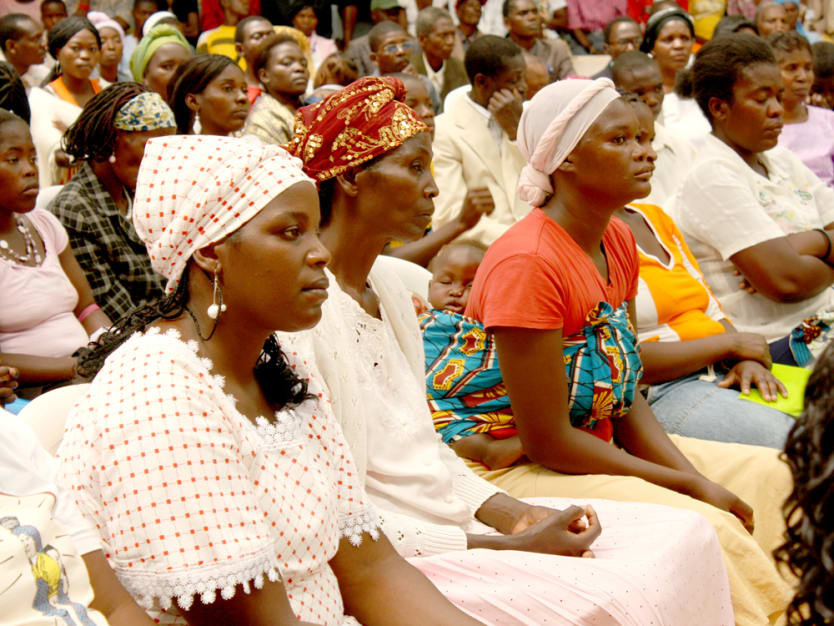
Although the factors that influence women’s vulnerability are complex, the solution to address this vulnerability doesn’t have to be: committing to mainstreaming gender considerations into all activities of development programs, regardless of technical focus. The most effective way to address women’s empowerment is to ensure that all activities and programs in a development portfolio incorporate gender factors so that, together, men and women (and children) can contribute in a coordinated and consistent way to effecting sustainable change.
Since gender inequality is rooted in so many different aspects of a country’s institutions and culture, it’s not surprising that addressing vulnerabilities and empowering women requires an integrated approach. At Chemonics we have seen firsthand that truly effective programs that deliver results do so by empowering women and protecting the most vulnerable groups in a society, specifically by addressing the cultural beliefs that restrict women’s participation, by changing the legal and institutional frameworks that prevent equal participation, and by shifting patterns of power.
Three powerful ways that mainstreaming gender can change the way we do development and improve women’s engagement and participation include:
1. Educating Communities So Women Are Better Able to Participate
Raising awareness is often the cornerstone of women’s empowerment programs because it can transform the way that communities think about women’s roles, rights, and responsibilities. Education and outreach must provide women and girls with the knowledge and skills they need to participate and create an enabling environment for them to actually do so. Although crucial, it is not enough to provide primary and secondary education. There is also a need to raise awareness about gender issues among whole communities. In Colombia, where a brutal 50-year conflict has intensified the repression of women and girls, Chemonics recently trained 28 local women to lead the charge in raising awareness of women's rights in their communities. These women have been doing amazing work so far and have trained hundreds of other women to lead the charge in their own communities. One woman, Manuela Bonilla, is serving as an advocate for other victims in her community. As she explains, Manuela never used to leave her house or speak in public. Today, she is able to speak up in her community and to help improve the situation of families and women impacted by violence. Manuela is a powerful reminder that women have a critical voice and play a crucial role in post-conflict societies.
2. Transforming Systems to Improve Women's Rights
Frequently community structures — including local government, law enforcement, and health care institutions — are unresponsive to women’s rights, designed more to support men's needs and rights in the community, and thus perpetuate inequality. When this happens, development programs must support these structures so they are more responsive to women's needs and rights. By mainstreaming gender considerations into rule of law programs, local governance programs, and even land rights programs, communities can transform the necessary systems and empower women. We have seen this happen in Tajikistan where Gulbahor Rajabova, a farmer, found herself in danger of losing half of her land, and subsequently, her livelihood. Gulbahor’s predicament was all too common in Tajikistan, but her reaction was unique. She challenged the businessman and took him to court. Through the Tajikistan Land Reform Project, a collaboration between Chemonics, USAID, government stakeholders, and civil society, Gulbahor received training and legal support to help her with her case that eventually ended up in the country’s Supreme Court, and decided in her favor. After having won her legal case, Gulbahor could have returned to farming but she decided to be more involved in the project and now regularly meets with female farmers to inform them about the social and legal support they can seek out.
3. Moving Beyond Traditional Economic Empowerment
Economic independence is often cited as key to empowering women. But for women to have equal access to and benefit from community resources, these activities must move beyond traditional training programs. On the surface, economic growth programs may not seem like potential gender programs; however, trade reform, promoting business enabling environments, and workforce development can and do transform women’s economic empowerment in ways that traditional training simply cannot. Of the more than 41,000 people working in Jordan’s tourism sector, for example, women make up only 10 percent. Tourism can offer many great career opportunities for Jordanian women and a recent USAID program, implemented by Chemonics, offered scholarships to get more women involved in the industry, and the payoff has been enormous. Dana Al Sabbagh, a young Jordanian woman, is just one example. She has managed to turn a love of cooking into a career, interning at a five-star restaurant in Amman and even traveling abroad to expand her skills. Now, she not only has a better source of income for herself and her family, but is contributing to Jordan’s emerging role as a premier tourist destination.
Our experience shows that when gender is mainstreamed in critical sectors it can have powerful and lasting impacts. And by integrating gender considerations across sectors, development programs can transform the systems that enable women to transform their own lives and that of their communities. This isn't a simple or easy task, but we believe that if we don't integrate gender in all of our development practices and programs, women and girls' rights and opportunities will be stifled, and the programs will not achieve their full potential and long-lasting impact. We recognize that women's rights and participation are fundamental to global development, prosperity, and peace and stability and, as such, our development efforts must reflect this awareness so that our efforts can help lead to powerful and positive changes.
Want to learn more? Check out She Builds and tweet us using #SheBuilds.
She Builds is a month-long conversation hosted by Devex in partnership with Chemonics, Creative Associates, JBS International, the Millennium Challenge Corp., United Nations Office for Project Services and U.K. Department for International Development.








